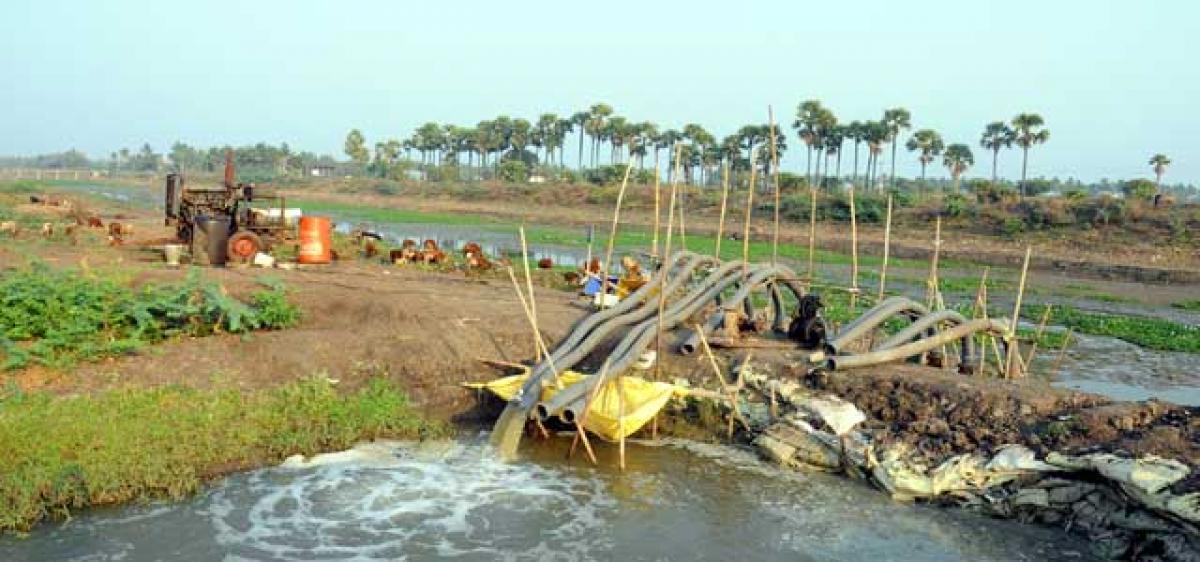Live
- Jaffna Titans to face Hambantota Bangla Tigers in Lanka T10 Super League opener on Dec 11
- Odisha farmers will get Rs 800 more per quintal of paddy: Majhi
- Canada confirms first domestically acquired human case of H5N1 bird flu
- Aspirants continue stir in Prayagraj against UPPSC’s staggered exam plan
- AI-Powered Legal Research to Enhance Compliance
- Rohit, Virat have left Indian cricket in safe hands: Kaif reacts after strong show from youngsters
- Derogatory remarks case: Madras HC denies anticipatory bail to actor Kasthuri
- Arvind Kejriwal Visits Tirumala Offers Prayers to Lord Venkateswara Swamy
- BJP, JD-S trying to bring down Cong govt; we will not let it happen: K’taka Home Minister
- How to Get the iPhone 15 at Rs 27,960 Off - Step-by-Step Guide to Availing the Discount
Just In

Y Vijayalakshmi, a farm worker from Anamapudi village under Nandiavada mandal in Krishna district, was once a major financial support for her five-member family. Now, she is heavily depending on her husband, thanks to the onslaught of aquaculture which robbed her source of income in paddy cultivation.
Anamanapudi (Krishna dt): Y Vijayalakshmi, a farm worker from Anamapudi village under Nandiavada mandal in Krishna district, was once a major financial support for her five-member family. Now, she is heavily depending on her husband, thanks to the onslaught of aquaculture which robbed her source of income in paddy cultivation.
“I used to earn Rs 150 to Rs 200 a day and thereby remained independent. I am forced to depend on the meagre earnings of my husband now for my personal expenses, leave alone supporting the family, as there are no paddy fields to employ me now in our village”, she rues.
With this, the responsibility of feeding the five-member family falls on the shoulders of her husband who earns Rs 300 a day by working in aqua fields.
The case of Vijayalakshmi is a classic evidence for a spurt in gender poverty levels in Gudivada region, heart of the Krishna delta, after the massive conversion of farm fields into fish and prawn ponds. Like Vijayalakshmi scores of poor women remained jobless in Anamanapudi village.
A small group of 15-20 women managed to find work in a cotton mill near Gudivada some 15 km away. Over 80 per cent of 3,000-odd acres of farm lands turned into aqua fields which provide seasonal employment to the workers unlike paddy cultivation.
Pollution of drinking water sources induced by aquaculture takes a heavy toll on the family economy of S Dhanalakshmi. “Our family outgo for water is not less than Rs 25 a day. We need at least two cans of filter water each costing Rs 12 for drinking and cleaning utensils,” she explains. The water price goes up to Rs 20 a can during the summer.
As the day breaks, the villagers set out for an odyssey for water by making a beeline to the flourishing water plants in Gudivada.
A visit by The Hans India team unfolds the pathetic story of the Gudivada region, which was once dotted with lush-green paddy fields, marked by a vast expanse of ponds and no greenery around.
Dhanalakshmi’s husband, once a paddy farmer with 3 acres of fertile land, has become a clerk in a shop in Gudivada for a monthly income Rs 3,000.
Besides, Dhanalakshmi’s land, now converted into fishponds, fetch her an annual income of Rs 57,000 from the land lease. With no other source of income, Dhanalakshmi feels spending over Rs 700 every month on water is a strain on her family economy.
“There is no other go. We can’t live without water, you know,” she says, resigning herself to the harsh reality. Drinking water sources like canals and village tanks became unfit to meet the needs of humans and animals as they were highly contaminated with the waste water containing pesticide and feed residues let out form the aqua ponds.
As a result, villages such as Anamanapudi, Yelaparru, Puttagunta, Janardhanapuram, Gongalamudi, Thummalapalli, Lingavaram, Thamirasa, Gandepudi, Sankarapadu, Rudrapaka, so on and so forth, in Nandiwada mandal are facing acute drinking water problem.
“Our Gudivada area was once endowed with paddy cultivation with round the year water supply from the Krishna river and a major supplier of foodgrains to the other parts of the State till the year 2000. Now we have become buyers of rice,” laments D Vijayarao, Anapanapudi village sarpanch.
Muralikrishna, a leader of the Andhra Pradesh Rytu Sangham from the area, said 80 per cent of 41,000 ha of farm lands under Nandiwada mandal have been converted into aqua fields.
Incidentally, the APRS is deploying teams to East and West Godavari and Krishna districts for a field visit from January 27, seeking urgent steps to save the two delta regions, known as the rice granary of AP, from the threat of aquaculture.
Meanwhile, Akkineni Bhavani Prasad, leader of the Krishna Delta Parirakshana Samithi, said aquaculture has become an inevitable phenomenon in the delta regions due to the government’s alleged failure to ensure timely release of canal water and paddy cultivation becoming economically unviable.
By: T Sudhakar

© 2024 Hyderabad Media House Limited/The Hans India. All rights reserved. Powered by hocalwire.com







